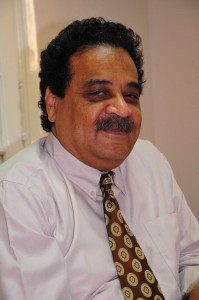
Several months before the elections for Egypt’s House of Representatives, scheduled to take place this coming October, many Egyptians are asking: what is the plan of those political parties participating in these elections? Some ask this question not because they doubt that these elections will take place at its scheduled time, but rather because they seek to know, nearly two years after the revolution, what exactly have we reaped from it? Or in other words, they are curious as to whether the country’s political map has changed at all.
In my opinion, there are many ways to assess the division and political polarisation we see today in Egypt. For example there are the social divisions that exist between the country’s civil and religious forces, in addition to cleft between left and right wing political parties. The spread of these divisions is contingent not only on individual choices, but it is also determined by the public mood, which at the moment is mostly divided among civil and religious lines.
What I am trying to do in this article is paint a picture that best depicts the fault lines along which Egyptian society is divided at the present time. The country’s three main primary political forces are the political Islamic groups, the democratic movement, and those who support the revival of a strong, hegemonic Egypt.
Before going into detail regarding the three political forces, we should first point out attempts being made by some to blur the lines between the second and third group, seeing as both have been deemed secular and therefore hostile to the country’s Islamists. We should note both that these divisions cannot be altered or changed by force or voluntarily action, and that the polarisation of the parliamentary elections was not divided solely between civil and religious lines. There was also feloul (remnants of the former regime).
We will now go into detail regarding the country’s feloul, who have been subjected to harsh attacks and criticism from both civil and religious groups.
Feloul, as their opponents choose to refer to them, or the “supporters of a strong, hegemonic Egypt”, which is the more objective term that I choose to use, or “supporters of a nationalist Egypt” as they seek to refer to themselves, seem to be in a better position today than they were before the previous parliamentary elections. Their leaders say that they did not actually take part in these elections, as many of the country’s leading families and political figures refrained from participating. Instead, they chose to fade into the background, waiting for the appropriate time to re-emerge. With the recent rise of the Muslim Brotherhood, and subsequent failure to administer the country, many see that for these groups the time is now, during the upcoming parliamentary elections.
We believe that their claims are not valid; for they were forced not to participate in the elections, and those who did faced a heavy defeat. Now, many look to the country’s feloul, in hopes that they will help revive a model for a strong, hegemonic Egypt without reviving its burdens. The feloul will no doubt seek to liken themselves to previous leaders of Egypt, such as Muhammad Ali and Gamal Abdel Nasser, promising to promote development and growth, while conveniently leaving out democracy. They may even revert back to using slogans from the Nasser era, such as “no freedom for the hungry”, which sought to justify the lack of democracy that existed during that time.
In the previous elections, the feloul ran largely as independent candidates, with a small number joining political parties, eventually obtaining less than 0.5% of the vote, and failing to join any larger coalitions. This is different today as many of those parties and candidates have united under the Mou’tamar (Conference) Party led by Amr Moussa, a fact which has helped them “wash away” their previous image and join the country’s National Salvation Front (NSF). This stands in contrast to Ahmed Shafiq’s Egyptian Patriotic Movement, which despite expanding its ranks, has not joined the NSF, largely due to Shafiq’s image as a symbol of the old regime.
I believe that Shafiq’s party will play a major role in the upcoming elections, as he is seen by most Egyptians as the primary alternative to President Morsi. Those who seek to revive the old regime will move towards Shafiq’s party, seeing as they have been rejected by most other parties. They will be joined by those who have strong financial and business interests in the country, who will view Ahmed Shafiq as a means by which to re-enter politics.
Amr Moussa, who is viewed as an independent political figure, even during Mubarak’s era, will be more attractive to those who still despise the country’s feloul.
Moussa will portray himself as one who seeks to revive a strong state that simultaneously promotes democracy and political compromise, while Shafiq and his supporters will cast themselves as those who are best equipped to reverse the gains of the Muslim Brotherhood.
Is the disagreement in the nationalistic group related to the extent of tyranny, or the strength and dominance of the country? I say yes. If Amr Moussa’s Mou’tamar Party successfully hides itself within the NSF, then this shows that they are one side of the nationalistic group that shouldn’t be underestimated, even if this is to a lesser degree than the country’s democractic movement. This reality may prove to be both a blessing and a curse for the latter, for encouraging the nationalistic group to adopt democracy will not be easy.
There are of course other parties and groups in the nationalistic group that are of less importance, for instance the “Independence Movement”. However, I feel that those who would seek to revive Egypt’s strong, hegemonic state will be primarily divided between supporters of Amr Moussa’s Mou’tamar Party and Ahmed Shafiq’s Egyptian Patriotic Movement, the latter of which will eventually run as a part of the NSF.




